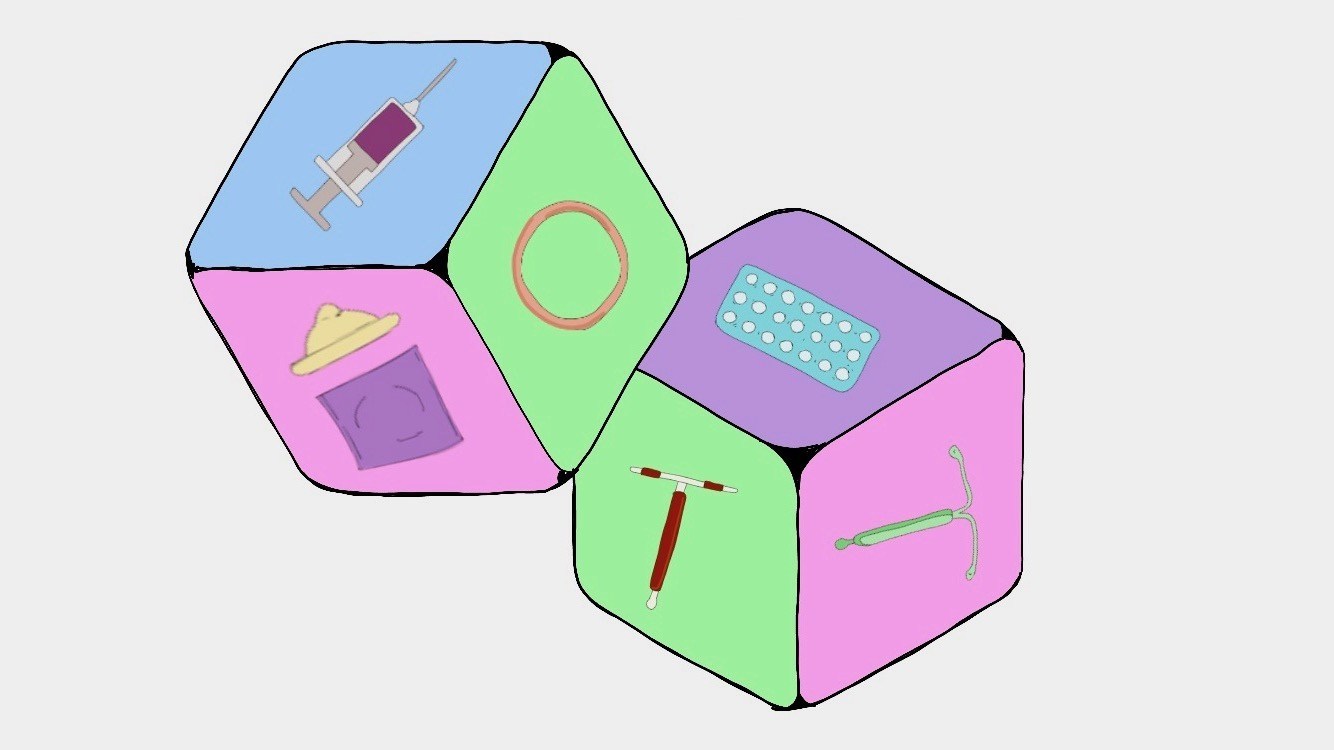After a summer long hiatus, Crybaby is thrilled to revamp our monthly series, the Birth Control Diaries. The series was created by Story Editor Zoe Allen and Writer Irine Le to evoke conversation about and bring awareness to the trials and tribulations of birth control.
Illustration by Sam Tuvesson
Jenna Leahy, 20, junior at the University of Oregon (Eugene, OR)
Birth control method: Tri-Previfem (The Pill)
Oral contraception, oftentimes known as “the pill,” is a hormonal birth control method that is taken daily. The pill comes in two forms: a combination or progestin-only pill. According to Planned Parenthood, “it is safe, affordable, and effective if you always take your pill on time. Besides preventing pregnancy, the pill has lots of other health benefits, too.” For more information on the pill, click here.

When and why did you start taking birth control?
I started I believe sophomore year of high school, so about 2014 or 2015. [I started taking the Pill] because I have super heavy periods, which is something that runs in my family, and I wanted a way to lighten up my periods, so I went on the pill.
Since you started taking the Pill, what has been your experience with it?
I’ve had a pretty good experience with it; it definitely lightened up my period which was good. I got Nexplanon, which is like “the bar” in my arm, senior year of high school and I had that for about a year and a half and I had not so great experience with it because it ended up giving me my period every day for that entire time. So, I went back on the Pill during my freshman year of college and I like it, but I have to set an alarm every day just to keep myself accountable. But it’s mostly for lightening up periods, so if I’m like a half hour late or anything, it’s not the biggest deal in the world. But I do like the Pill.
Nexplanon is a contraceptive that is implanted in your arm. It is over 99% effective, and can last for up to three years. Many women feel more comfortable using contraceptive implants, because unlike the Pill, which relies on one’s own ability to remember to ingest the contraceptive, birth control such as Nexplanon solely require the initial implant. For more information on contraceptive implants, click here.
Could you talk about your experience with Nexplanon?
I wanted to get it because it’s a more secure contraceptive; there’s very low change of pregnancy on that and I didn’t want to accidentally miss a pill and then get pregnant. I got it, and they say a lot of the times people don’t have their period at all when they’re on it, but it depends on everybody’s bodies, so I was just super unlucky. And I would’ve gotten it removed a month in, but since it’s so expensive–it’s like 1,000 dollars–so I kept it in for a year because I was like “I need to wait it out” because it’s so expensive. I know so many people that have it and it works really, really well for them, and they have not had a period in years, but it just didn’t work for my body. It was frustrating, but I don’t mind; the pill is just another thing that I have to do throughout the day.
Would you recommend Nexplanon to a friend?
I haven’t heard of anyone else having a bad experience with it, so I definitely would recommend it to people if their insurance covers it so you don’t have to pay 1,000 dollars for it like I did. You just never know how it will affect your period. It stays in for about three years I believe, and you might not have a period for three years, and if that’s what you want, then that’s a good option, but you don’t know which is kind of unfortunate. You’re gambling with a “will I, won’t I.”
Has there been a time on the Pill that you’ve felt seriously concerned about the reliability of it?
I don’t think so, I’m pretty good about it when I need to be. I’ve never had a problem where I’m unsure when I’m going to get my period, because I do have the placebo (sugar pill) week and it always comes on time which is nice and reassuring. I’ve never really been scared that the Pill isn’t working, because I never miss it.
Anna Dubon, 19, sophomore at the University of California, Berkeley (Berkeley, CA)
Birth control method: Skyla (Intrauterine Device)
An Intrauterine Device, more commonly known as an IUD, is a small device that is inserted into your uterus. According to Planned Parenthood, “it’s long-term, reversible, and one of the most effective birth control methods out there.” For more information on IUDs, click here.

Have you been on other methods before you got the Skyla?
I have had the Mirena IUD twice before I got the Skyla.
Did you have any side effects with the Mirena? What led you to getting the Skyla?
So many side effects! First, I noticed my period lasted for many weeks past the usual length. I know it’s very common for there to be spotting for a long time after insertion, but my flow was heavier than just spotting and it was interfering with my daily life. But the main reason I had to get my first Mirena removed was that it was actually falling out of my vagina. When I did my routine checks to make sure the strings were still reachable, I could feel the actual plastic, which is not supposed to happen. I could even feel it when I walked, almost like when you don’t insert a tampon far enough in. It was a really long process after that. I had to get my IUD removed and they inserted another Mirena, this time farther up in uterus supposedly, but the same thing happened again. I had to get an ultrasound at one point and they found that my uterus is naturally shaped in a way that it cannot keep the Mirena.
Did the doctors ever suggest an alternative birth control method after both the Mirenas expelled? What made you decide to try an IUD again?
Yes. We discussed almost every other option, but what I liked most about the IUD is that it’s one and done, you know? I can be pretty forgetful and I didn’t want a birth control method that I could forget to use. Even though the Mirena gave me so much grief, I was determined to make it work!
Were there any other side effects you experienced that told you there was something wrong with the IUD like pain?
Nope, not physical effects. The doctor told me it wasn’t even functioning properly because it had fallen so out of position!
After getting your Skyla, was it easy to be able to trust your birth control? Were you nervous that there was a change the IUD could come out again?
I definitely was nervous! The Skyla is the smallest type of IUD so I knew there was less risk, but I was still very cautious. Honestly, the whole experience really made me distrust my body more than the birth control. Most IUD users don’t have to go through what I did.
Did your knowledge of different types of birth control prior to getting your IUD the first time affect why you got the IUD?
When I think back on it, I realize how lucky I was to have received a relatively comprehensive sexual education in high school. A lot of people don’t even know the IUD (or other options) exist and will just go straight to the pill (or nothing at all). I had already heard of most of the types of birth control (class, friends, online etc) so I think I was able to make a pretty educated decision.
Despite your previous experiences with the Mirena, how has your overall experience with birth control been? Would you say birth control has been a more positive factor for your health?
Yes, despite everything that has happened, I still would 100% recommend the IUD (or really any form of birth control). I’ve had Skyla for about two years now and it’s been awesome. Even though birth control isn’t 100%, it just adds so much extra security. At this point in my life, pregnancy is something that I don’t want to worry about and I generally don’t have to.

